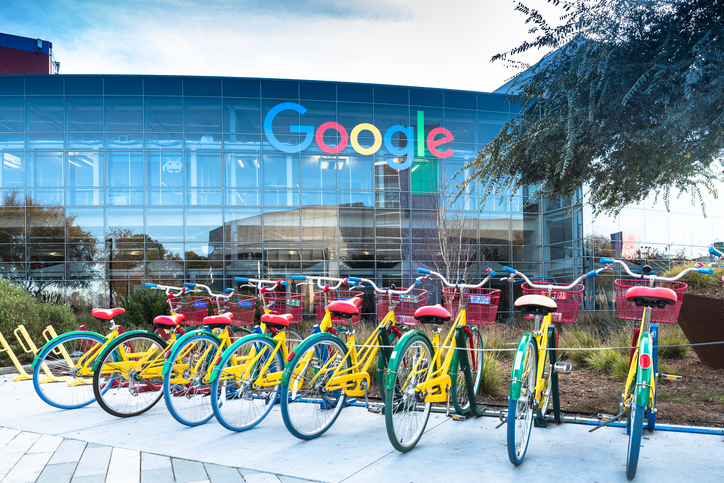Stockwatch: look no further than this amazing tech giant
Our companies analyst has one of the world’s biggest technology companies in his sights this week.
30th July 2021 11:22
by Edmond Jackson from interactive investor
Our companies analyst has one of the world’s biggest technology companies in his sights this week following publication of latest results.

How significant are bumper second-quarter 2021 results from Alphabet Inc (NASDAQ:GOOG), owner of the multifarious Google operation and Android smartphone operating system?
Revenue has soared 62%, or 57% at constant currency to $61.9 billion, a near 11% beat on consensus for $56 billion.
Cost of revenue rose 41% and operating expenses by 22%, but they still meant an excellent operating margin of 31% which flags a business to prioritise.
$18.5 billion net income meant earnings per share (EPS) of $27.26 versus $19.14 expected, a massive 42% beat.
Yet the stock has been flat around $2,730 in response, as have Microsoft (NASDAQ:MSFT) and Apple (NASDAQ:AAPL), which also beat expectations – if not to quite the same degree.
This is nearly 2% off Alphabet’s 27 July all-time high and the trailing price/earnings (PE) is around 29x versus same for Apple and 36x for Microsoft.
- Want to buy and sell international shares? It’s easy to do. Here’s how
- US tech and UK mid-caps star in July
These charts are all a near-perfect parabola: Alphabet began to rise in 2012 from $300 and accelerated with the onset of Covid from $1,400 to a recent high of $2,780.
You could say the market is broadly efficient here: respecting very strong competitive positions for these tech behemoths, fat margins and likely resilient customer demand going forward.
PE multiples are full but nowhere near as distorted as during the 2000 tech bubble.
Yet an adage also says that when bull market leaders no longer respond to earnings beats, in particular, it signals a stale market.
Right now, those who want to buy equities have substantially done so but are edgy to protect gains after stocks have enjoyed a big boost from monetary stimulus; moreover, US inflation has breached 5%.
A genuine re-rating is under way
The second quarter of 2020 saw Alphabet’s first-ever year-on-year revenue decline as Covid disrupted growth and advertisers pulled spending.
It was only a 2% easing but yes, “advertising” remains the key revenue driver and relates to the overall level of commercial activity hence is strictly cyclical.
Prior to that, it had been easy to brush aside cyclical concerns while Google had capitalised on a one-off shift from traditional commerce to online.
Yet Google is now so pervasive in modern life and is radically advancing Artificial Intelligence (AI) in support of functions that serve essential daily needs: such as Drive for cloud storage, Play for App developers and users, Maps for navigation, YouTube for entertainment and Workspace for enterprise needs.
The table shows Google Search as the predominant revenue contributor at 58% compared with 56% a year before, then YouTube ads at 11% and Google Network at 12%.
While Cloud is entertained as a long-term growth driver, as yet it represents just 7% of revenue and a £0.6 billion loss if down from a $1.4 billion loss in 2020.
In operating profit terms, Alphabet is therefore wholly reliant on Google Services which contributed $22.3 billion for a net operating profit of $19.4 billion.
Retail is also by far the largest contributor to growth of advertising; with travel, financial services, media and entertainment also significant.
Yet I believe this does not constitute a high risk because Google is radically more effective than traditional marketing, for most businesses.
The pandemic has more likely re-rated Alphabet’s financials than provided a one-off boost.
Furthermore, just over half the group’s revenues derive outside the US which puts Google in a powerful position internationally as developing countries expand their internet coverage.
On a genuine long-term view, it seems possible to argue “anytime” is a good time to accumulate Alphabet stock.

Longer-term risks of regulation check Google’s strength
Such a stronghold on “infrastructure of the internet” recalls lessons of investment in 19th-century mining booms, when it proved far better to invest in picks and shovels than take the risk of mining itself.
The flip-side is becoming a target for anti-trust regulation in the US, meanwhile governments experience frustration low rates of tax being paid – for example criticism in the UK that Alphabet “writes its own rules” on taxation.
Alphabet’s stance is it paying what tax is due in other countries alongside 80% of its tax in the US as its home country.
Cynics may dismiss the “picks and shovels” argument given the same was said about Cisco Systems (NASDAQ:CSCO) in 1999-2000: that its routers, switches, software and services were a key enabler of the internet. Its stock then slumped from a $77 high near $10 and 21 years later trades at $55.
Yet in March 2000, Cisco’s trailing PE approached 200x which was overblown.
A market-specific risk would be a general de-rating of more highly-rated stocks if inflation becomes ingrained. This economic risk currently coincides with an edgy balance of investors in the stock, so yes, the next few months could be tricky – or conceivably generate another buying opportunity.
Alphabet Inc - segmental analysis
| Quarter ended 30 June | ||
| Revenue: $ millions | 2020 | 2021 |
| Google Search & other | 21,319 | 35,845 |
| YouTube ads | 3,812 | 7,002 |
| Google Network | 4,736 | 7,597 |
| Advertising total | 29,867 | 50,444 |
| Google other | 5,124 | 6,623 |
| Google Services total | 34,991 | 57,067 |
| Google Cloud | 3,007 | 4,628 |
| Other bets | 148 | 192 |
| Hedging gains/losses | 151 | -7 |
| Total revenue | 38,297 | 61,880 |
| Traffic acquisition costs | 6,694 | 10,929 |
| Number of employees | 127,498 | 144,056 |
| Operating income: | ||
| Google Services | 9,539 | 22,343 |
| Google Cloud | -1,426 | -591 |
| Other bets | -1,116 | -1,398 |
| Corporate costs | -614 | -993 |
| Total income from operations | 6,383 | 19,361 |
Promising qualitative aspects within Google Services
Items within the earnings call underline Alphabet’s grip.
Management cites a rising tide of online consumer and business activity; record revenues also for publishing partners (over $120 billion earned altogether by developers, globally, within Google Play); record traffic to third-party websites, also billions of direct connections such as phone calls, directions, ordering food and making reservations. AI will in due course enhance all this.
“Multi-task Unified Models” constitute a big advance in Google Search offering capability across 75 languages – hence ability to source in one language and yield information in another. As is
“Lambda” which achieves a new level of natural conversation capabilities, making information and computing more accessible.
Android 12 is due release soon, offering new ways to personalise devices and significantly improve speed/power efficiency; with new in-built privacy protections.
- ii view: Facebook looks to develop the ‘metaverse’
- ii view: iPhone helps Apple set new profits record
Cloud revenues are up 52% year-on-year, helped by new products. Organisations such as PayPal, Johnson Controls and Whirlpool have deployed their SAP software solutions on Google Cloud.
It is said also to benefit from expertise in real-time data and analytics, as a differentiator from the competition.
New solutions against cyber and ransomware attacks were launched at a recent Cloud Security Summit, with BT and Adobe bringing some of these to market.
They are said also to be helping strong growth for Google Workspace, enabling client wins such as Carvana, the online auto retailer, and Red Hat software.
YouTube is rolling out Shorts, a new short-form video experience that has just surpassed 15 billion daily views; and good progress with subscription products across music and TV.
Buy the dips, if identifiable
Hopefully, this gives you an “essential case” overview, why I believe Google is set to remain a long-term quality growth stock – and increasingly among international portfolios.
Yes, there is short to medium-term downside risk in a rather tired technical situation for big tech stocks, if inflation means tighter monetary policy.
With fresh money therefore, you might wait and see – or vainly hope – if the second half year onwards might generate a better buying opportunity than near an all-time high.
But with an operating margin over 30%, I do not envisage the PE rating contracting much unless there is an anti-trust assault. Overall: Hold.
Edmond Jackson is a freelance contributor and not a direct employee of interactive investor.
These articles are provided for information purposes only. Occasionally, an opinion about whether to buy or sell a specific investment may be provided by third parties. The content is not intended to be a personal recommendation to buy or sell any financial instrument or product, or to adopt any investment strategy as it is not provided based on an assessment of your investing knowledge and experience, your financial situation or your investment objectives. The value of your investments, and the income derived from them, may go down as well as up. You may not get back all the money that you invest. The investments referred to in this article may not be suitable for all investors, and if in doubt, an investor should seek advice from a qualified investment adviser.
Full performance can be found on the company or index summary page on the interactive investor website. Simply click on the company's or index name highlighted in the article.
Disclosure
We use a combination of fundamental and technical analysis in forming our view as to the valuation and prospects of an investment. Where relevant we have set out those particular matters we think are important in the above article, but further detail can be found here.
Please note that our article on this investment should not be considered to be a regular publication.
Details of all recommendations issued by ii during the previous 12-month period can be found here.
ii adheres to a strict code of conduct. Contributors may hold shares or have other interests in companies included in these portfolios, which could create a conflict of interests. Contributors intending to write about any financial instruments in which they have an interest are required to disclose such interest to ii and in the article itself. ii will at all times consider whether such interest impairs the objectivity of the recommendation.
In addition, individuals involved in the production of investment articles are subject to a personal account dealing restriction, which prevents them from placing a transaction in the specified instrument(s) for a period before and for five working days after such publication. This is to avoid personal interests conflicting with the interests of the recipients of those investment articles.